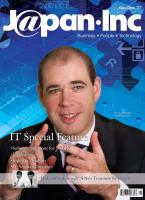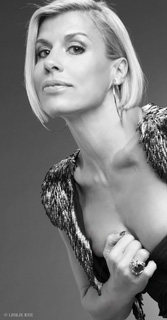My interview with JAPAN INC.
Miss Universe Japan
In 1998, if you happened to be a pretty Japanese girl walking through Yoyogi park, you might have encountered a frantic French woman on a bike offering you the chance to find fame and fortune as a competitor in the Miss Universe Japan contest. The Miss Japan pageant had existed since 1952 but it wasn’t until 1998 that it became the Miss Universe Japan competition. Having somehow managed to secure a sponsorship deal with direct marketing firm Amway, Ines Ligron, pioneer of Miss Universe Japan had to make sure that she had some viable candidates for the competition. By making up for what she lacked in Japanese ability with a good head for business and designer bagfuls of confidence, Ligron was able to go ahead with the pageant and had secured funding for the next three years.
For the first year she hired by Donald Trump but, of a strong entrepreneurial inclination, after the first year, she obtained the license from the Trump Organization thus making herself founder and president of Miss Universe Japan. This year, she really hit the headlines when Riyo Mori of Shizuoka became the winner of the international contest. This success was what Ligron had been working for since she first came to Japan. She told us that this was ‘the point that I wanted to get to’ and she is unashamed to take part of the credit for the triumph. ‘I have become better at my job. I know how to turn the girls from the condition in which they arrive in my office into Miss Universes.’ The girls often come from the countryside and if they make the cut for the final 15, they stay at Ligron’s house and are dressed in only the best and most expensive clothes.
They receive intensive training, to turn them into confident, beautiful superstars. When asked how the family reacts to having 15 models living with them for a fair chunk of the year, Ligron explains that initially her husband didn’t like it. ‘Most men
would be happy to let a Calvin Klein model use their razor but my husband used to find it annoying. But he is very supportive and has got used to it. I also have two boys aged six and seven living at home and the girls treat them like princes. They are going to have very high standards in the future….’
While the contest and Ligron have attracted media attention as a result of the nature of the pageant and the reader friendly images it can offer, the business and the force behind it are equally worthy of focus. (Although we are unable to include
photos in this newsletter, a visit to /muj_ines_ligron will provide).
Ligron first came to Asia when her husband was moved to Hong Kong. She was, at the time, selling tanning machines in Europe and she explained to her boss that she wanted to move to HK. Reluctant to lose a talented rep, her boss offered the role of selling the machines in all Asia. So, in a country where white skin is a sign of beautiful chic, Ligron found a niche market selling tanning machines to luxury hotels; because of the perception that the Chinese market was not a good place to
sell tanning equipment, there was zero competition and yet a small but significant demand for the machines from visiting celebrities and models who expected tanning salons in the hotels where they stayed.
After doing this for about two years, Ligron’s sales ability got her was recruited by the IMG model agency. Then, in backstage discussions at a Victoria’s Secret’s fashion show, her name came up as the person to head up the operations of Miss Universe in Japan, the trademarks brought by Donald Trump in 1997. After her initial success with Amway, Ligron came up with a unique business model. ‘I had to offer companies something more than just event sponsorship. So with little experience and without knowing how to make a PowerPoint presentation in Japanese, I put together a very attractive package. What I offered was a unique form of product placement.’ When the final shortlist of 15 girls is made, they sign a six-month agreement by which they surrender all control over their image to Ligron’s company. She tells them what make-up to wear, what brand of bag to carry and what bottled water to drink. For cosmetics companies this gives them a stake in the transformation of the girls and, as well as the media exposure, they get rights to use the winner at events and all kinds of opportunities to promote their products. At roughly 20 million yen a package, the business is highly lucrative.
Nowadays, Ligron sees these deals as more than sponsorship, ‘they are promotional partnerships. I choose companies that are good for women and have a synergy with the aims and ideals of the contest. For example, I would never partner with KFC.’ Among the partners for Miss Universe Japan 2008 Ligron is proud to include such names as Samantha Thavasa, Evian, Jaguar and Maybelline.
Ligron admits that she had a fair amount of good luck along the way. For instance, in the early years she never had to pay for office space: her first office was provided by a former distributor she had a connection with. Unfortunately, he ended
up disappearing overnight, probably due to his yakuza activities that led him into trouble with the police. However, she claims that she works 12 hours a day and confided that her determination is partly the result of a feeling of being different that she has had since childhood. ‘My family are all talented performers, my mother was a child-actress and my father was a Chef but I couldn’t sing or dance. But, I do have a skill, and that is to be able to see the potential for beauty in people, particularly women, and I know exactly at first sight how to transform and improve them. I went into business as an entrepreneur when I was 21 and since then I have been very comfortable with who I am.’ I love to teach young girls tools for success and hapiness.
By Peter Harris
Chief Editor





